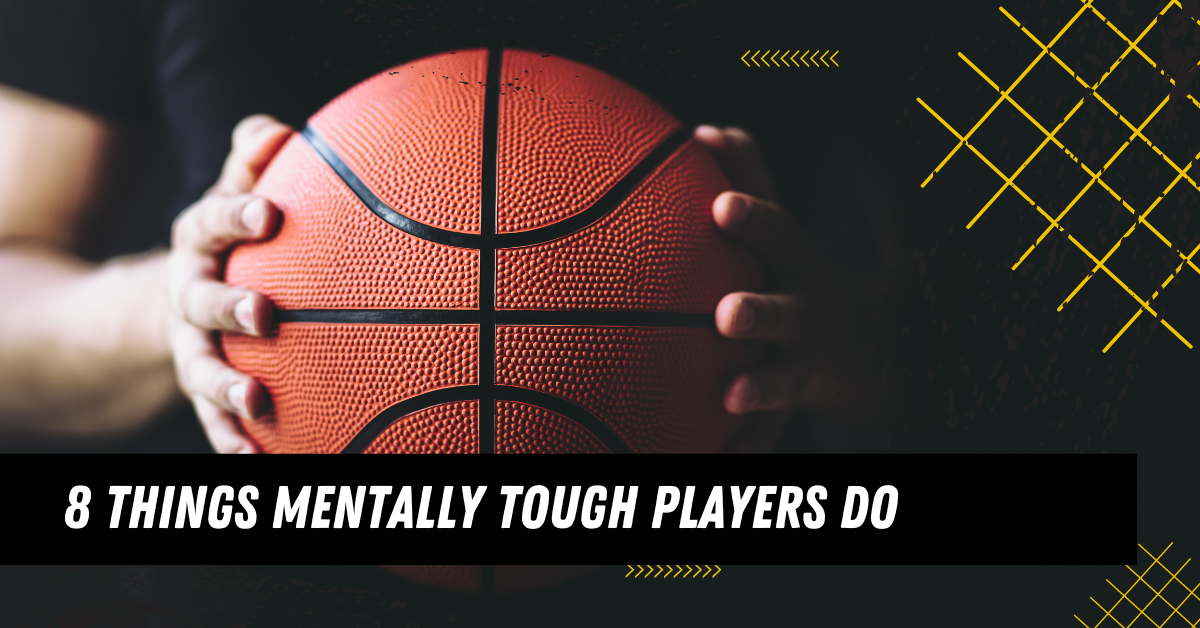8 Things Mentally Tough Player DoThe mentally tough players are few and far between in the game of basketball. This is the number reason why mentally tough players are so cherished by coaches far and wide. Most mentally tough players are naturally this way but every player can be better mentally if they focus on a few minor things.
Let's look at the 8 things mentally tough players do in games and practice. 1. Don't Blame The Refs One of the toughest things players struggle with is blaming the game officials. It's a natural reaction, and most commonly modeled by the parents and coaching staff. It's the coach's job to make sure the game official is respected by the players, coaching staff and parents or fans. While this isn't often taught or modeled, this is a facet of the game that seems to be going away. Game officials are humans and almost inevitably make a mistake, miss a call from time to time. When players and coaches begin blaming the refs, they're most certainly derailed from the objective of the game, and focused on their own actions. 2. Next Play Mentality There are an estimated 70 possessions in a high school basketball game. Allowing yourself to throw away the next 2 or 3 plays because of the previous one can be detrimental to the player's overall performance and affect the team strategy moving forward. If a player misses a shot, turns the ball over or misses an easy layup, often times we'll see a mentally weak player, put their head down, or begin pouting. Nerves play a factor as well. It is ideal to shrug off that play, because there is no way of going back into time, unless you're Thanos, and getting that play back. Mentally strong players have a "next play" mentality. 3. Block Out Negativity and Distractions Whether you're experiencing a tough season, and it's easy to be negative about things that aren't going your way, mentally strong players block out the negativity and focus on improving every possession, every play, every shot, every game, and every practice. Negativity is like the flu, it is highly contagious and goes through your team quickly, if not caught and treated early on. It is recommended to help athletes work through issues, keep the moral high, and focus on staying positive for the team. Another element are distractions. Distractions from home-life, school, or opposing fans can be harmful to a team's performance. Typically, a star player will get grief from an opposing teams student/fan section. These are natural, but shouldn't be barriers to an athletes performance. 4. Learning From Mistakes Mistakes are lessons in disguise. A mistake on the court can be addressed, corrected and turned into a positive experience for athletes. It is the coach's job to ensure that each athlete is rectifying mistakes in practice and through competitive drills, help correct those mistakes and turn those into positive performance actions for future play. 5. Overcoming Adversity Every basketball season is going to be loaded with adversity and challenge. Every basketball season has an injury, sickness, issues in the classroom or home life. These are great opportunities to work through challenges and learn positive coping mechanisms to overcome future challenges. The coach is a great resource for helping identify solutions to these challenges through mentorship and guidance. 6. Lead By Example Mentally strong players thirst for leadership opportunities, they want to lead through their actions, and it's the coach's responsibility to identify those who wish to lead. Leading by example comes in many forms. This could be on the court, off the court, in the classroom, in the community and at home. Deion Sanders, Head Coach for Jackson State University has a pre-season meeting with all of his players and tells them in order to wear the Jackson State jersey, you must be in class on time, sit in front of the classroom paying attention, asking questions, and representing the program in a positive light. This includes in the classroom, on campus, and in the community. This approach sets the precedent that the players are students before they're athletes, and that academics is as much a part of the program as the athletics portion. 7. Making Hustle Plays Count Hustle plays are everywhere in a game. Chasing down the offensive rebound to get your team an extra possession is a great hustle play. Diving on the floor to get the 50/50 balls are great hustle plays. Sprinting back and taking a charge on a 3-on-1 fast break is a great hustle play. Mentally tough players understand that every possession matter in the game of basketball, and if you can earn another 4 or 5 possessions through hustle plays - your team will be in a better position for the victory. 8. Play With Confidence Playing with confidence comes from doing the work in the off-season. Kobe Bryant, in an interview was asked, "How did you know that you were going to make that game winner?" His response was, "I made that shot thousands, no, tends of thousands of times in the off-season with pressure defense on me and tired legs. Why would this shot be any different?" That's the epitome of confidence. Conclusion Becoming a mentally tough player doesn't happen overnight, it doesn't happen in a couple of weeks, it doesn't happen in the pre-season. It happens over time. The more amount of work you're putting in the greater your confidence level will skyrocket. If you're getting daily touches, seeing additional court time, and putting in the work, you'll become a mentally tough player that leads by example, plays with confidence, and learns from your mistakes. |
Rising Stars Basketball |
Areas ServedHayward Wisconsin
Lac Courte Oreilles Winter Wisconsin Bruce Wisconsin Hurley Wisconsin Birchwood Wisconsin Bayfield Wisconsin Ashland Wisconsin |
Rising Stars BasketballWisconsin AAU Basketball
Crossover Crew 3v3 Basketball League Skills Camps Tips & Articles Workouts & Drills Podcast |
Contact Us |
Rising Stars Basketball Club | 10767 Nyman Ave, Hayward Wisconsin | www.Rising-Stars.us | Powered by Superior Marketing

